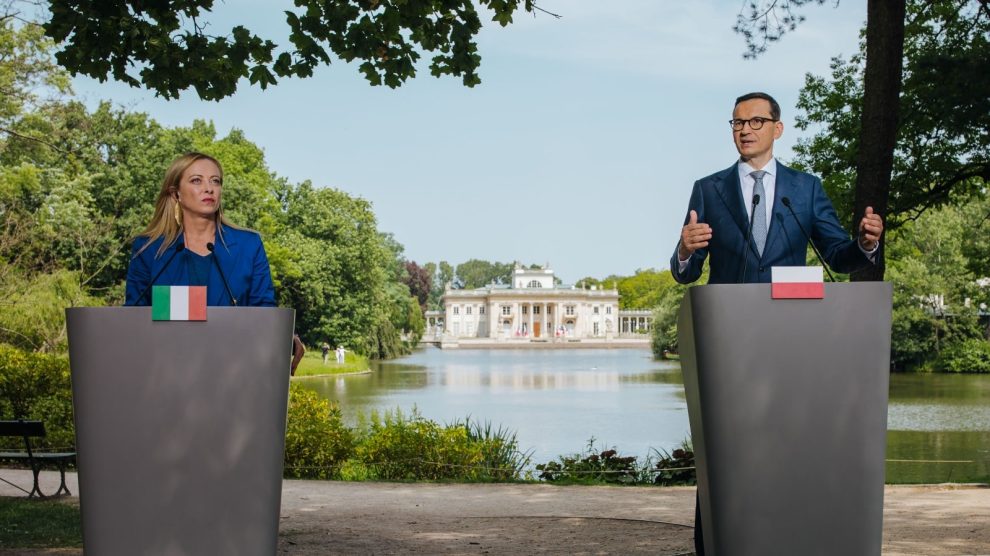Giorgia Meloni heads to Warsaw. On Wednesday, the Italian Prime Minister landed in the Polish capital for an official visit with her homologue, Mateusz Morawiecki, shortly after the two had spoken at last week’s European Council meeting. The trip also signals deepening diplomatic ties between Rome and Warsaw, following an earlier visit in February.
Let’s get political. The 2024 European elections were front and centre, as both PMs are part of the European Conservatives and Reformists group in the European Parliament – which Ms Meloni heads with her Brothers of Italy party, and where Mr Morawiecki’s PiS party represents the largest delegation, though the former is projected to outnumber it after next year’s election.
- During the visit, they also took part in the ECR’s “Study Days” event along with delegations from all the group’s national parties. And both participated in the “Future of the European Union” conference along with President Duda and the ECR’s two presidents, PiS’ Ryszard Legutko and Brothers of Italy’s Nicola Procaccini.
From the horse’s mouth. Our sister website got in touch with Mr Procaccini, who just made Politico’s Power 40 Brussels list of EU agenda-setters. He explained the events were an occasion to flesh out the main points of ECR’s political platform – both programmatic priorities, “starting from the founding values, such as attention to the family, education, culture,” and economic issues, especially “the need to make environmental protection compatible with the resilience of the EU’s economic and social structure.”
- The current legislature, he said, has been marred by “ideological radicalism” on environmental issues”, with drastic impacts on the economic, production, and energy system. We propose to correct this approach.”
- On foreign policy, he stressed ECR’s intention to uphold the “respect for international law and thus support Ukraine in the face of Russian aggression.” And as PM Meloni told the press before departure, EU enlargement – or rather the “reunification” of European nations, as she put it – will also be crucial.
Define Europe. “We believe in a European Union that is united in diversity and national specificities, a Europe of peoples and nations. We contest the drift of the European super-state towards which the leftists are leaning; we would like a European Union of free and sovereign peoples who stand together on a few, big issues rather than on a multitude of issues that invade the daily lives of our fellow citizens, feeding a voracious and faceless bureaucracy. This is what we oppose,” explained Mr Procaccini.
Leaning where? These points definitely mark a degree of convergence with the centre-right European People’s Party, which PM Meloni’s ECR has been flirting with to build an alliance and an European Parliament majority. But despite the ECR probably being the fastest-growing party in terms of seats, both will need extra help to pull their weight in Strasbourg.
- However, PM Morawiecki flatly rejected the prospect of the ECR allying with the EPP. On their part, members of PM Meloni’s party highlighted the need to keep an “open mind” about EU alliances.
- Troubles have also been growing on the national front, as Antonio Tajani (head of Forza Italia and EPP Deputy President) recently rejected an alliance with hard-right parties and clashed with Matteo Salvini’s League, who’s part of the Identity and Democracy European group that hosts such forces.
- Both Messrs Tajani and Salvini, along with their parties, are part of PM Meloni’s governing coalition – which she hopes to project into its European Parliament equivalent.
The migration matter. Along with Hungarian PM Viktor Orban, PM Morawiecki was responsible for halting last week’s European Council decision to implement the EU’s new migration deal – which PM Meloni has been advocating for. The two “agreed to disagree” on the issue, with the latter noting she couldn’t be “disappointed” from the Polish PM’s pursuit of his “national interest”.
- As Mr Procaccini told our sister website, there is a general agreement on the need to stop irregular immigration by working with the countries of origin and transit and countering human smuggling. “This means at the same time fostering regular immigration flows towards Europe, as labour and culturally compatible as possible, so as to make their integration easier,” he said.




